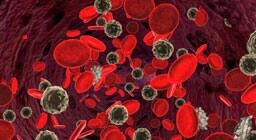London: Children who are born with fusion of two specific chromosomes are more prone to suffer from Acute lymphoblastic leukemia (ALL), a common childhood cancer.
The researchers found that this type of fusion, known as a Robertsonian translocation, increases a person's risk of developing the rare leukemia by 2,700 fold.
“Although rare, people who carry this specific joining together of chromosomes 15 and 21 are specifically and massively predisposed to this form of leukemia,” said Christine Harrison, a professor at Newcastle University.
This form of ALL - called iAMP21 ALL - requires more intensive treatment than many other types.
The scientists used modern DNA analysis methods to reconstruct the sequence of genetic events that lead to iAMP21 ALL.
"We have been able to map the roads the cells follow in their transition from a normal genome to a leukaemia genome," Harrison said.
The team developed new insights for analysing genome data that can reveal the sequence of complicated genetic changes that cause a healthy cell to become cancerous.
They can now take a cancer cell at one point in time and deduce the relative timing and patterns of mutational events that occurred in that cell's life history.
“The method we have developed can now be used to investigate genetic changes in all cancer types,” noted Yilong Li from the Wellcome Trust Sanger Institute, a genome research institute in Britain.
















